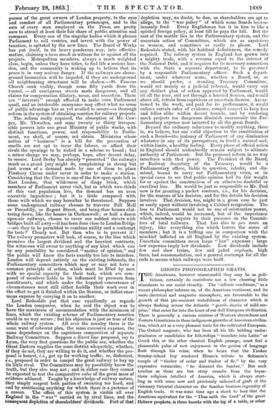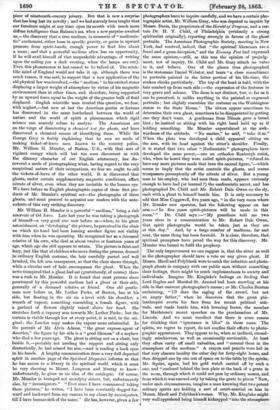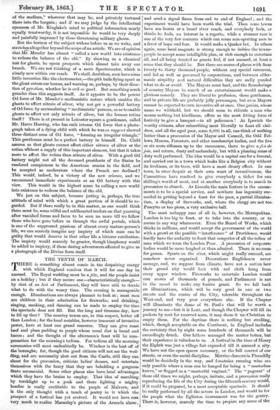GHOSTS PHOTOGRAPHED GRATIS.
THE Americans, however unsuccessful they may be as poli-
ticians, certainly do contribute not a few cheering little stimulants to our social vivacity. The "telluric conditions," as a recent philosopher informs us, of the American continent, and its more electrical and magnetic atmosphere, are favourable to the growth of that pre-eminent wakefulness of character which is always flashing across the Atlantic " gentle shocks of mild sur- prise," that enter far into the heart of our dull European civilization. There is generally a curious mixture of Western shrewdness and Eastern Gnosticism in these indigenous growths of American civiliza- tion, which act as a very pleasant tonic for the cultivated European. The Oxford magnate, who has been all his life bidding under- graduates or candidates for fellowships " translate into Latin" or Greek this or the other classical English passage, must feel a pleasurable pulse of new enjoyment in the genius of language flush through his veins, when he hears that the Yankee Sunday-school boy rendered Hiram's tribute to Solomon's temple of "timber of cedar and timber of fir," by the very expressive vernacular, " he donated the lumber." But such touches as these are but stray crumbs from the loqua- cious religious intellect of America, which is always start- ling us with some new and previously unheard-of graft of the visionary Oriental character on the familiar business ingenuity of English trade. It was some time ago a shock to hear that the American equivalent for the " Thus saith the Lord" of the great Hebrew prophets, is three knocks with the leg of a table, or other piece of nineteenth-century joinery. But that is now a surprise that has long lost its novelty ; and we had scarcely been taught that our furniture might at any time open its mouth with much more diffuse intelligence than Balsam's ass, when a new surprise awaited us,—the discovery that a true medium, in momenta of " mediumis- tic" excitement, either loses in specific gravity, or gains in upward pressure from spirit-bands, enough power to float him about a room ; and that a powerful medium often has an opportunity, if he will avail himself of that unspeakable advantage, of writing upon the ceiling (on a dark evening, when the lamps are out). Even this phenomenon at last ceased to be talked of. The scien- tific mind of England would not take it up, although there was much reason, it was said, to suspect that a new application of the old physical law was involved,—the " medium " in his etcited states displacing a larger weight of atmosphere by virtue of his magnetic environment than at other times, and, therefore, being supported by an upward force equal to the weight of the greater bulk of fluid displaced. English scientific men treated this question, we fear, with neglect,—but now at last the American genius or fortune has discovered in the same borderland between the world of nature and the world of spirit a phenomenon which rigid science can scarcely refuse to analyze. The Americans are on the verge of discovering a chemical test for ghosts, and have discovered a chemical means of identifying them. While Sir George Grey is feebly explaining that he sees no mode of making ticket-of-leave men known to the country police, Mr. William H. Mumler, of Boston, U.S., with that sort of vigilant energy which will but too soon discontent us with the dilatory character of our English aristocracy, has dis- covered a mode of photographing what, having regard to the very =spiritual nature of their occupations, we fear we ought to call the tickets-of-leave of the other world. It is discovered that ghosts, under certain supplementary magnetic conditions, affect nitrate of silver, even when they are invisible to the human eye. We have before us English photographic copies of these first pro- ducts of Mr. Mumler's spiritual art—the photographs of three ghosts, and must proceed to acquaint our readers with the ante- cedents of this very striking discovery.
Mr. William H. Mumler is a powerful " medium," being a rich reservoir of Od force. Late last year he was taking a photograph of himself—a very good one now before us—when, to his great astonishment, on "developing" the picture, he perceived in the chair on which his hand had been leaning another figure not visibly with him when he was operating. He recognized her as a deceased relative of his own, who died at about twelve or fourteen years of age, which age she still appears to retain. The picture is faint and hazy, just like that of children who move during the process, dressed in' ordinary English costume, the hair carefully parted and well brushed, the left arm transparent, so that the chair shows through, while a circular sort of halo encompasses the ghost. When the news transpired that a ghost had sat (gratuitously, of course) there was a rush to Mr. Mumler. It is found that most persons since pourtrayed by this powerful medium had a ghost at their side, generally of a deceased relative or friend. One old gentle- man now before us, Mr. Luther Parks, of Boston, has at his side, but floating in the air on a level with his shoulder, a wreath of vapour, something resembling a female figure, with a garland of flowers slightly raised above her head. She stretches forth a vapoury arm towards Mr. Luther Parks ; but the curtain is visible through her at every point, it is said, in the ori- ginal; the London copy makes the vapour more substantial. In the portrait of Mr. Alvin Adams, " the great express-agent of America," the figure by his side is a " good likeness" of a nephew who died a few years ago. The ghost is sitting not on a chair, but beside it,—probably not needing the support and sitting only dramatically, he had missed his aim,—and is reading a book open in his hands. A lengthy communication from a very dull departed spirit in another page of the Spiritual Magazine informs us that he has access to a library in the spiritual world, which it must be very cheering to Messrs. Longman and Murray to know : =fortunately, he gives us no idea of the catalogue. Of course, Mr. Mumler is besieged not merelyby sitters, but, unfortunately aleo, by "investigators." "Ever since I have commenced taking these pictures," he writes, " I have been constantly dogged for- ward and backward from my camera to my closet by investigators, till I have become sick of the name." He has, however, given a few photographers leave to inquire carefully, and we have a certain pho- tographic artist, Mr. William Guay, who was deputed to inquire by Messrs. Davis, the proprietors of the Herald of Progress, and a cer- tain Dr. H. T. Child, of Philadelphia (evidently a strong spiritualist originally), reporting strongly in favour of the ghost portraits. The American Photographic Society, meeting in New York, had resolved, indeed, that " the spiritual likenesses are a. fraud and a gross deception," and the Evening Post had expressed the same opinion,---still, as this was the opinion of prejudg- ment, not of inquiry, Dr. Child and Mr. Guay attach no value to it, and believe. One of the ghosts thus photographed is the statesman Daniel Webster, and bears " a close resemblance., to portraits painted in the latter portion of his life-time, the sunken cheeks particularly. The top of the head is bald, with the• hair combed up from each side ;—the expression of the features is very grave and solemn. The dress is not distinct, but, so far as it can be perceived, is unlike anything in the painted or engraved• portraits ; but slightly resembles the costume on the Washington statue in the State House." The sitters appear sometimes to: determine their own ghost, sometimes to be disappointed by getting, one they don't want. A gentleman from Illinois gave a broad. hint ; he insisted on sitting with his right hand held up as if holding something. Mr. Mumler expostulated at the awk- wardness of the attitude. " No matter," he said, " take it so.' When the plate was developed a child appeared sitting on the arm, with its head against the sitter's shoulder. Finally, it is stated that two other " Mediumistic " photographers have developed the same power,—one an orthodox Roxburgh artist,. who, when he heard they were called spirit-pictures, "refused to have any more pictures made that bore the second figure,"—which seems to imply that the artist controls the ghosts, and warns. tresspassers peremptorily off the nitrate of silver. But a young man in his employ, who had seen them made, appears curiously enough to have had (or learned ?) the mediumistic secret, and has. photographed Dr. Child and Mr. Robert Dale Owen on the sly, each with a ghost to himself beside him. It is only necessary to• add that Miss Coggswell, five years ago, " in the very room where Mr. Mumler now operates, had the following appear on her arm :—' In five years spirit-pictures will be made in this room." Dr. Child says :—" My guardians told me two. years since in a communication to Mr. Robert Dale Owen, that spirit photographs would be taken just as they are- at this day." And, by a large number of mediums, far and near, the same thing has been foretold. It is clear, therefore, that. spiritual prompters have paved the way for this discovery. Mr. Mumler was bound to fulfil the prophecy.
The only improvement we can suggest is, that the sitter as welli as the photographer should have a veto on any given ghost. If Messrs. Maull and Polyblank were to catch the infection and photo- graph ghosts in company with our public men without consulting. their feelings, there might be much unpleasantness to society and individuals. Imagine Mr. Kinglake's feelings on finding that Lord Raglan and Marshal St. Arnaud had been scowling at his. side in that eminent photographer's rooms ; or Mr. Charles Buxton exclaiming, " I'll dare the raging of the crowd, but not an angry father," when he discovers that the great phi- lanthropist averts his face from his recent political atti- tude, and reads beside him, with lowering frown, the member- for Maidstone's recent speeches on the proclamation of Mr. Lincoln. And we must recollect that there is some reason for thinking that " ignorance is bliss" in these cases. The spirits, we regret to report, do not confine their efforts to photo- graphic appearances. They appear to be, when so inclined, exceed- ingly mischievous, as well as occasionally serviceable. At least they often carry off small valuables, and " conceal them in the atmosphere of the medium." A crayon and pencils were hid in. that very obscure locality the other day for forty-eight hours, and then dropped one by one out of space on to the table by the spirits.. Mr. Squire, again, had his gold watch carried off by such a. one, and "enclosed behind the iron plate at the back of a grate in the room, through which it could not pass by ordinary means, and from which it was rescued only by taking the grate to pieces." Now, under such circumstances, imagine a man knowing that two potent military spirits are holding a sort of court-martial on him in Messrs. Maull and Polyblank's rooms. Why, Mr. Kinglake might very well apprehend being himself kidnapped " into the atmosphere
of the medium," wherever that may be, and privately tortured there into the bargain ; and if we may judge by the intellectual openness of Mr. Kinglake's mind to political information nearly equally trustworthy, it is not impossible he would be very deeply and painfully impressed by these threatening military ghosts.
But the horizon of the subject widens before us as we write, and stretches altogether beyond the scope of an article. We are of opinion that Mr. Muckier has almost " called a new world into existence to redress the balance of the old." By showing us a chemical teat for ghosts, he opens prospects which almost take away our breath. We are not thinking of a mere Spectrometer, which is clearly now within our reach. We shall, doubtless, soon have some little invention like the electrometer,—the pith balls flying apart as the ghost enters our houses, and warning us, perhaps, by their direc- tion of gyration, whether he is evil or good. But something much grander than this suggests itself. As it appedrs to be the potent Od force of Mr. Mumler's mediumistic nature which enables the ghosts to affect nitrate of silver, why not get a powerful battery of Od force, by accumulating " mediumistic" persons, so as to enable ghosts to affect not only nitrate of silver, but the human retina itself ? There is at present in Leicester square a gentleman, called Mr. Harro Harting, who has such intense Od force that a photo- graph taken of a dying child with which he was en rapp9rt showed three distinct suns of Od force, " forming an irregular triangle.'' This gentleman must be a perfect battery in himself. Dr. Child assures us that ghosts cannot affect either nitrate of silver or the retina without a supply of this important element, but that it takes more to affect the retina than nitrate of silver. With a good Od battery might not all the deceased presidents of the States be rendered conspicuous to the American armies in the field, and be accepted as moderators where the French are declined? This would, indeed, be a victory of the new science, and we recommend immediate experiments at an Od battery with this view. This would in the highest sense be calling a new world into existence to redress the balance of the old.
We jest on this subject, because jesting is, perhaps, the true attitude of mind with which a great portion of it should be re- garded. But if there really be in this matter, as one would think there must be, some wilful and coldhearted traders on that yearning after vanished forms and faces to be seen no more till we follow those who have gone before us through the awful portals, which is one of the suppressed passions of almost every mature person's life, we can scarcely imagine any impiety of which man can be guilty that would deserve in that other life a bitterer retribution. The impiety would scarcely be greater, though blasphemy would be added to impiety, if these daring adventurers affected to give us a photograph of the Divine form itself.
































 Previous page
Previous page